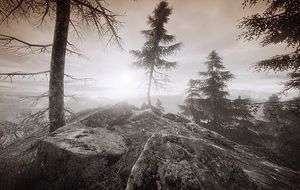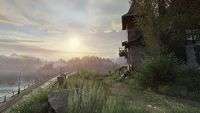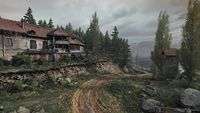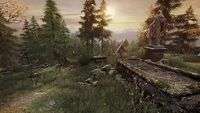The Vanishing of Ethan Carter – Review
by Lorna

|
 You couldn’t get two more contrasting games than The Vanishing of Ethan Carter and Bulletstorm, the link between them being their developer, The Astronauts – formed by the founders of Bulletstorm dev People Can Fly. Hanging up their Energy Leashes, they’ve made one of those games. Those games which immerse you in the experience, which are about the story, and which have scorn and inexplicable anger poured on them by people who take it upon themselves to police what constitutes a game (hint: anything with a gun, celebrity voice/appearance, explosions, and/or a hooker will see something pass muster).
You couldn’t get two more contrasting games than The Vanishing of Ethan Carter and Bulletstorm, the link between them being their developer, The Astronauts – formed by the founders of Bulletstorm dev People Can Fly. Hanging up their Energy Leashes, they’ve made one of those games. Those games which immerse you in the experience, which are about the story, and which have scorn and inexplicable anger poured on them by people who take it upon themselves to police what constitutes a game (hint: anything with a gun, celebrity voice/appearance, explosions, and/or a hooker will see something pass muster).
When I read who had developed Ethan Carter, I thought someone was taking the piss. You can’t get more over the top, gleefully brash, and loud than Bulletstorm. And The Vanishing of Ethan Carter is as far removed from that camp as facts are from David Irving. It is a sedate, gentle, melancholic experience. It is thought-provoking. It is the opposite of Bulletstorm, and that surprising feat, before we get to anything else, means that The Astronauts should be applauded.
It is hard to write about The Vanishing of Ethan Carter without tearing open the game and spilling its secrets, exposing its heart. When the game is the story, it is hard to discuss one element without jeopardising the other for those who eschew spoilers. And to have this game spoiled would rob the player of the journey, forever changing how you perceive it.
 You are Paul Prospero, a supernatural private eye who has been receiving letters from a young boy called Ethan Carter, who writes of strange things in the place he lives. Then the letters stop. It is your job to find out why, and what has happened to Ethan. Journeying to Ethan’s home of Red Creek Valley, you quickly realise that things aren’t quite right – there’s a lurking darkness that doesn’t want you there, and almost immediately you stumble onto the scene of a grisly murder.
You are Paul Prospero, a supernatural private eye who has been receiving letters from a young boy called Ethan Carter, who writes of strange things in the place he lives. Then the letters stop. It is your job to find out why, and what has happened to Ethan. Journeying to Ethan’s home of Red Creek Valley, you quickly realise that things aren’t quite right – there’s a lurking darkness that doesn’t want you there, and almost immediately you stumble onto the scene of a grisly murder.
The gameplay itself is interesting and quirky, but good luck getting there, at least at first. With the game telling you at the start that it ‘won’t hold your hand’, you are cast into this world with zero idea of what to do, other than the vague goal of finding Ethan, and with little idea of what constitutes a puzzle, or how to solve one. This is a problem. On one hand, it was rather liberating to have no map, no marker or waypoints, no guidance, no HUD. On the other, it meant a great deal of flailing around, walking, backtracking, head scratching, and more walking. At one point I even assumed that one element of the puzzling was a glitch, and happily ignored it, only to return much later, after wandering around and wondering what to do next, and try again. As much as it was frustrating, I understand what they were aiming for, and the sense of reality with which it imbued the game was appreciated, even if it came with a heavy, near-overwhelming dose of infuriation at times.
 |
 |
 |
 |
 |
 |
As the puzzles progressed, and the game – and Ethan’s life – began to open up, I started to have an idea of what was going on, overall, of how this might turn out, and although I didn’t quite expect the ending that was given (more on that in a moment), the main concept wasn’t hard to work out a glimmer of, given what you find and piece together throughout the game. The actual ending itself, however, is a different beast, and one which, despite its seeming simplicity, has inflamed much debate.
The developers themselves have alluded to several possible versions of what we were presented with, and fans of the game, who are happy to delve further, have been busy constructing theories about the ending, the world, the characters and their relationships, and everything else.
 It reminded me much of my own obsession with Alan Wake, which led me down many dark paths and into a 7000+ word article on the various ideas and theories behind the game’s many questions. While I believe that Ethan Carter doesn’t have as much left unsaid or open to interpretation, it certainly has scope. Whether this delving and theorising is borne out of a sense of dissatisfaction, and is therefore people seeing shadows where there are none, or whether people are on the right path to prising open hidden cracks and meanings that the developers have carefully secreted (and which may point to a different ending than we thought), who knows. And the devs are remaining tight lipped. It is intriguing, and while I admit to not feeling enough of a click with the game to do the same myself, I am keen to read more. Perhaps I was dissatisfied, perhaps, I see shadows, or perhaps I also noticed a few things that I have since questioned.
It reminded me much of my own obsession with Alan Wake, which led me down many dark paths and into a 7000+ word article on the various ideas and theories behind the game’s many questions. While I believe that Ethan Carter doesn’t have as much left unsaid or open to interpretation, it certainly has scope. Whether this delving and theorising is borne out of a sense of dissatisfaction, and is therefore people seeing shadows where there are none, or whether people are on the right path to prising open hidden cracks and meanings that the developers have carefully secreted (and which may point to a different ending than we thought), who knows. And the devs are remaining tight lipped. It is intriguing, and while I admit to not feeling enough of a click with the game to do the same myself, I am keen to read more. Perhaps I was dissatisfied, perhaps, I see shadows, or perhaps I also noticed a few things that I have since questioned.
That people care so much to even delve this far is a testament indeed to the game and characters that The Astronauts have created. A lonely boy, misunderstood and mocked by his family, exploring literature and allowing it to spark his own imagination, to offer even a small escape from the grim reality in which he lives, instantly becomes embedded in your consciousness.
Ethan’s world is both beautiful and almost heart-breaking. The game offers up an achingly beautiful place, dominated by vast lakes, mountains, forests marching to the horizon, and stunning vistas, and then fills it with a pervading sense of loss, of melancholy. At first it was hard to put my finger on exactly why. The music was low-key, as one would expect from a title like this, but critical in helping to evoke the aforementioned atmosphere.
 As the abandoned places opened up, the sense of both foreboding and sadness grew. Ruptured tracks, abandoned houses full of rubble and memories, a boarded up church, and more. Decay, abandonment, and, primarily, isolation – physically in where the tiny hamlet was situated, with Ethan himself (through what we learned of his family), and the feeling that the game itself imparts. The world takes hold in an serious way. The mournful, lonely weight, with the lurking darkness, starts to bear down, and I just wanted it to end, as beautiful as the place was. These feelings were masterfully evoked, using the – actually very small – setting, lighting, environments, and music to great advantage.
As the abandoned places opened up, the sense of both foreboding and sadness grew. Ruptured tracks, abandoned houses full of rubble and memories, a boarded up church, and more. Decay, abandonment, and, primarily, isolation – physically in where the tiny hamlet was situated, with Ethan himself (through what we learned of his family), and the feeling that the game itself imparts. The world takes hold in an serious way. The mournful, lonely weight, with the lurking darkness, starts to bear down, and I just wanted it to end, as beautiful as the place was. These feelings were masterfully evoked, using the – actually very small – setting, lighting, environments, and music to great advantage.
The puzzles themselves, once you figure out how they work, are well done and interesting. They were largely environment or story-based, having you find clues and piece together a chain of events to trigger a part of the story to play out. One of the few deviations from this was the ‘might shit you up, so be prepared’ mine section – I have to admit that it had my cravenly heart racing, and I couldn’t get out of there fast enough.
 |
 |
 |
 |
 |
 |
As magnificent a job as the devs have done with the world and everything in it, however, the amount of walking you have to do borders on the ridiculous. Getting from A to B is one thing, but when the game won’t let you see the last piece of the ending without you having solved all of the puzzles (some of which you may have missed) it’s infuriating. Given that one of the puzzles is slap bang at the start of the game and easy to miss, having to go all the way back (you can fast travel there, but it’s only one way), bugger about, and then walk all the way back to the end location is excruciating. And I only missed one – some poor bastards missed more. Ultimately, if you are going to give people the option to find their own path, to leave puzzles or miss them, then at least have the decency to let them be able to see the ending, without then forcing them to backtrack and solve everything.
The other hair-tearing issue I had was with the game saving. What there was of it. The game grudgingly saves only when you solve one of the puzzles, or read certain things scattered throughout the world. You can’t manually save, and there are no other checkpoints. This may be fine for players for whom 5 – 7 hours can be knocked down uninterrupted, but for others it is a real problem. Having to make your way back to a puzzle location and re-inspect the clues because the game didn’t save your progress is pretty shit and fairly inexcusable. Thankfully, it wasn’t enough to kill the game.
 Overall, The Vanishing of Ethan Carter was an intriguing, emotional journey. While there were flaws and issues, these were largely with the dry, technical things, leaving the rest as a firm success. The lonely valley, and the boy you’re sent to find will haunt you long after you shut down, and the story that we have been told lives far beyond the ending if you let it. And with these sort of games, that’s inevitable; for me, it’s one of the reasons that The Vanishing of Ethan Carter deserves its laurels.
Overall, The Vanishing of Ethan Carter was an intriguing, emotional journey. While there were flaws and issues, these were largely with the dry, technical things, leaving the rest as a firm success. The lonely valley, and the boy you’re sent to find will haunt you long after you shut down, and the story that we have been told lives far beyond the ending if you let it. And with these sort of games, that’s inevitable; for me, it’s one of the reasons that The Vanishing of Ethan Carter deserves its laurels.
One final note: Please do not discuss spoilers in the comment thread. If you have played the game, then you will know how important it is to let things unfold naturally. Any such comments will be moderated. Instead, if you are interested, then I will start a forum thread for such things. Thanks for the understanding and the respect for fellow gamers who may still wish to play.
Pros- Achingly beautiful world and detailed environments
- Endless photo ops for lollygaggers and game tourists
- Subtle, atmospheric music perfectly suits the game
- Interesting puzzles, especially the story based ones
- Story pulls you in and tugs you around
- An emotional, intriguing journey
- If you want to question, to think beyond what you saw, you can… there is scope
- You had to have a scary mine bit, you cruel bastards
- Lack of saving ability was a big issue, necessitating long treks and redoing investigations
- Giving players an open world, with the ability and freedom to play their way, and then snatching that back at the end if they missed (by accident or design) some puzzles, making them go back before they can see the ending is pretty poor
- Lack of help from the game can spill over from being realistic into being obtuse and frustrating, especially if it leads to puzzles being misunderstood or missed (creating the problem mentioned above)
The Vanishing of Ethan Carter is a small, slightly-flawed gem. The cleverly (and clearly lovingly) constructed world is small but deceptive with it, offering an achingly beautiful place in which to explore. For all its beautiful views and picture-perfect spots, the whole thing is infused with melancholy and a sense of loss and foreboding, from the decaying bricks of tumbledown houses, to the gentle, perfectly placed music, working in tandem with the environments to immerse you fully in the game's atmosphere.
While the sporadic nature of the saves is more than frustrating at times, more so is the game’s refusal to show you its ending if you have missed one of the puzzles. This is especially frustrating when you are given carte blanche to do as you will, and play your way, with the option to ignore puzzles (or genuinely miss them), only to have that right revoked before the final curtain, leading to tedious backtracking to distant locations.
That said, The Vanishing of Ethan Carter is a beautiful, thought-provoking story that lives on beyond its ending. Whether you accept what you’re given, or choose to see past it and question is up to you, but the fact there’s scope there rewards players for whom the story is everything. And in The Vanishing of Ethan Carter, the story is everything. Even if you don’t play ‘those games’, consider trying this. It’ll cost you a handful of hours and offer a surprising amount in return, if you let it.
Last five articles by Lorna
- Flagging Heart
- Where Have All the Hours Gone?
- I Heart... Overlord
- Life Goes On: Done to Death - Review
- Welcome to Spoilerville, Please Despise Your Stay



























There are no comments, yet.
Why don’t you be the first? Come on, you know you want to!